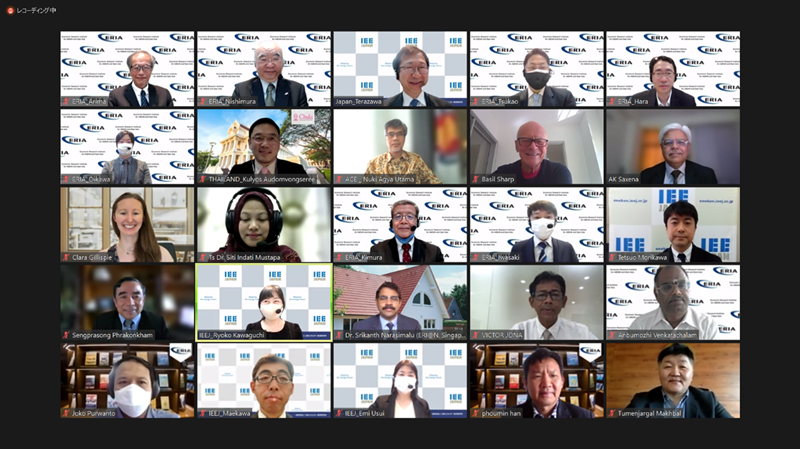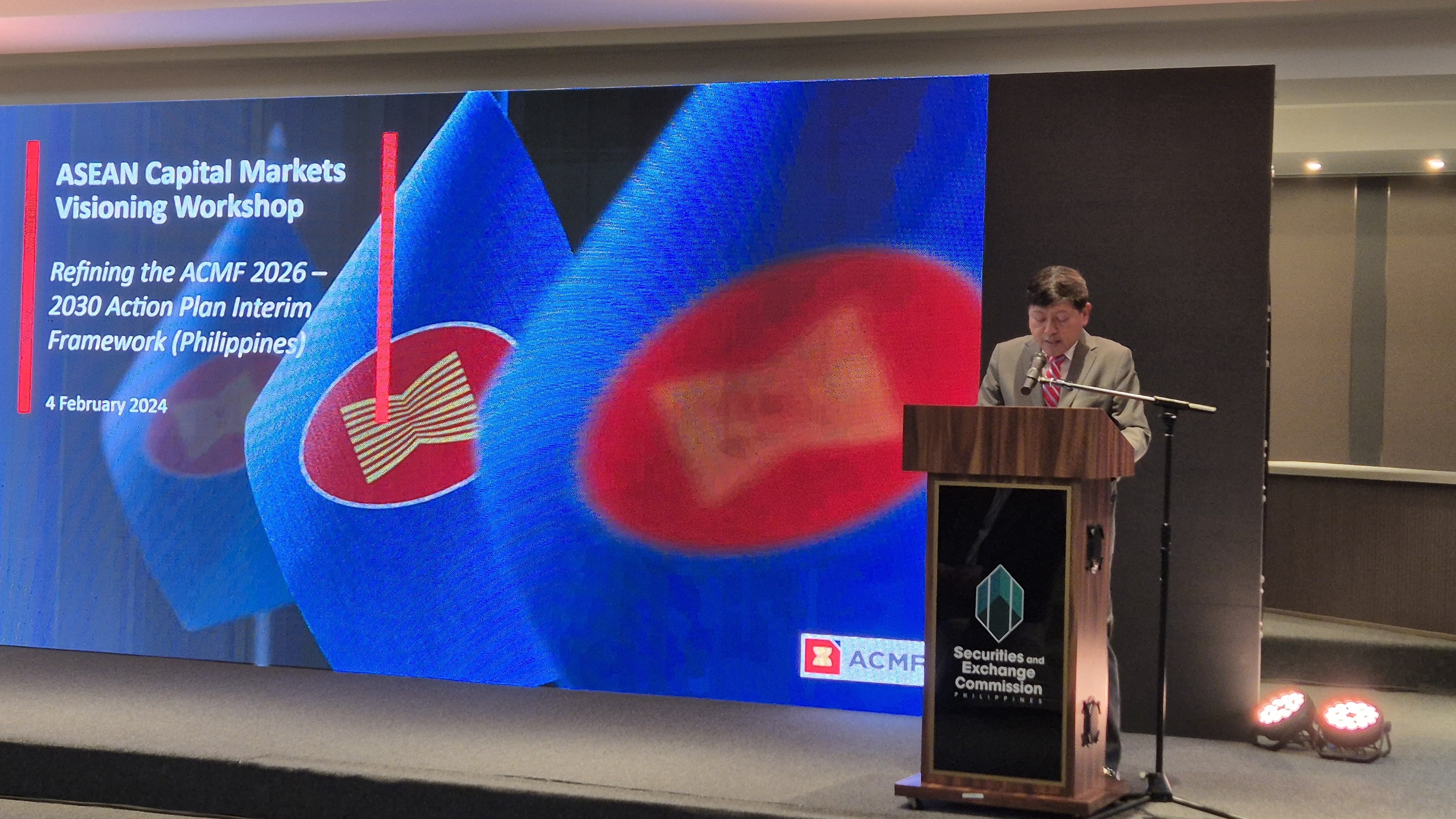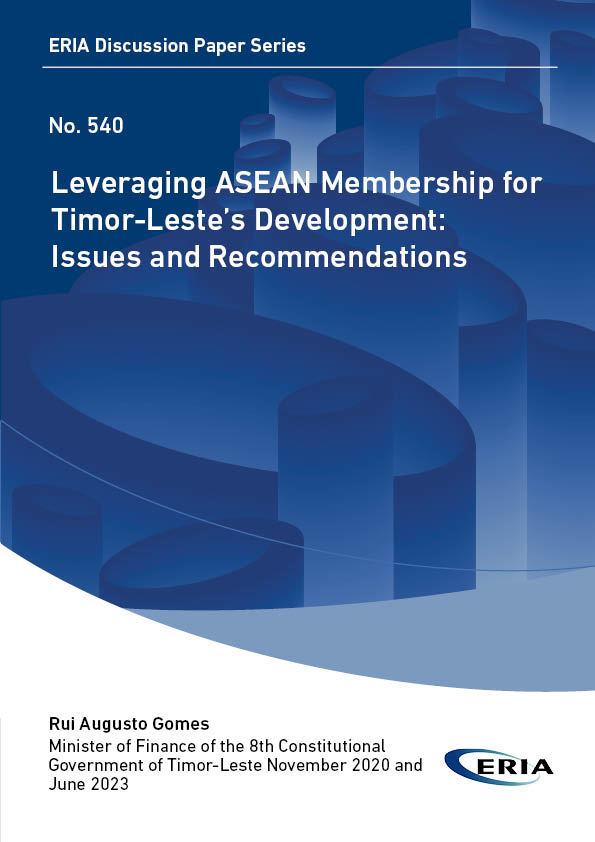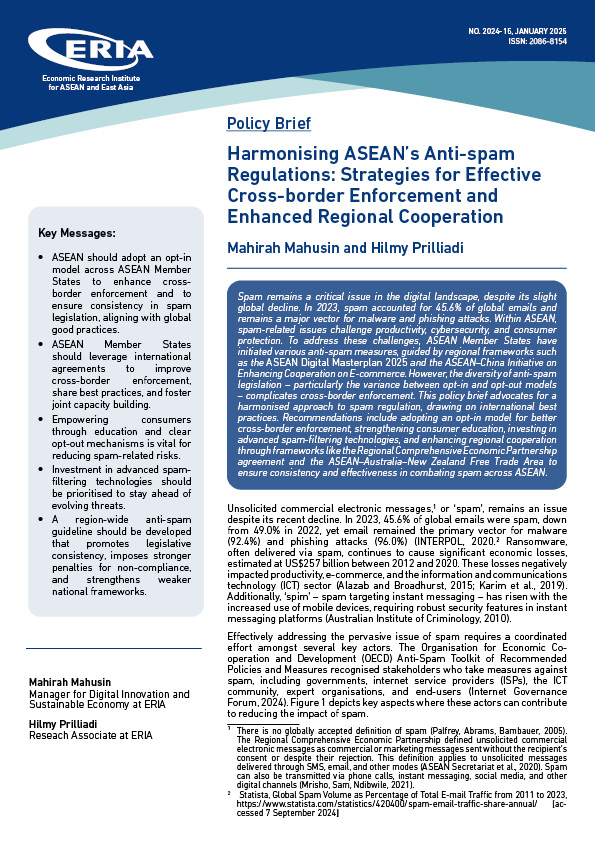Decarbonization of EAS Region the Focus of 10th Energy Research Institute Network (ERIN) Meeting
Date:
9 March 2022Category:
NewsTopics:
Energy, Energy Research Institutes NetworkShare Article:
Print Article:
Jakarta, 9 March 2022: The 10th Energy Research Institutes Network (ERIN) Meeting with the theme ‘Opportunity and Challenges of Decarbonization in the EAS Region’ was organized by the Economic Research Institute for ASEAN and East Asia (ERIA) and ERIN Secretariat on 9 March 2022 virtually. This all-day meeting brought together eighteen officials from ERIN member institutions.
Dr. Kulyos Audomvongseree, Chairperson of ERIN and Director of the Energy Research Institute (ERI) at Chulalongkorn University (CU), Thailand, gave his Opening Remarks, emphasizing the importance of energy, the environment, and climate change as global challenges. In his speech, he emphasized that the globe is presently dealing with the Covid-19 crisis, which has an impact on people's way of life and work, as well as energy consumption, which has shifted from the industrial and commercial sectors to the residential sector. On COP26, almost every government in the world has made a climate pledge and set goals for reducing greenhouse gas. Carbon neutrality has been set as a goal by the majority of ASEAN and East Asian countries.
Dr. Kulyos hopes that ASEAN's greenhouse gas reduction plan will become clearer this year, and the decarbonization, carbon neutrality, and net-zero will play a significant role in these regions. He also pointed out that more clean and greener energy sources will be required in the near future and the energy sector should move away from oil and gas and toward electricity. Therefore, fossil fuels used to generate power would be replaced with renewables like solar PV and hydrogen, which are better for the environment and can help alleviate climate change.
Dr. Kulyos ended his speech highlighting that the dramatic increase in the price of fossil resources, such as oil, gas, and coal, currently threatens an economic recovery from the covid-19 pandemic, reducing economic growth in several countries. This is yet another reason for accelerating the development of an economy that is less reliant on fossil fuels.
The second Opening Remarks was delivered by the Chairman and CEO of The Institute of Energy Economics, Japan (IEEJ), Mr. Tatsuya Terazawa. He presented about two important aspects of ERIN: first, achieving carbon neutrality is a difficult aim for any country. There should be numerous opportunities for collaboration among ERIN members and learning from the experiences of other members is critical; hence, ERIN will serve as an excellent platform for such learning and cooperation. Second, it is critical that ERIN act as a platform for expressing and explaining the diverse conditions that ERIN members face to other countries that lead discussions on energy and environmental policy.
The first presenter, Dr. Morikawa Tetsuo as Senior Economist and Manager, Oil Group, Fossil Energies and International Cooperation Unit, IEEJ, shared the first results of ERIN study projects for 2020/2021 on the strategic and economic value of joint stockpiling arrangements for middle east exporters and ASEAN importers. This study is a collaboration between ERIA, KAPSARC, and IEEJ with the goal of justifying and promoting the growth of oil storage in ASEAN countries, with a particular focus on the feasibility of collaborative stockpiling with Middle Eastern crude exporters.
Next, Mr. A. K. Saxena, Senior Fellow, Senior Director for Electricity & Fuel Division, The Energy and Resources Institute (TERI), India, explained the second study result on decarbonizing the Indian power system: studying the flexibility requirements for large-scale renewable energy integration. The objective of this study is to optimize the capacity expansion and system operation to minimize cost.
In the second session, Mr. Shigeru Kimura, Special Adviser to President for Energy Affairs, Energy Unit, Research Department of ERIA, presented the ERIN Energy Research Projects recruitment in 2022/2023. Mr. Kimura mentioned that ERIA solicits proposals from ERIN members which contain regional energy research aspects, then selects two. The content of the proposals should be in line with the EAS mid-term energy policy research roadmap. Members of ERIN will begin proposing research studies in July 2022.
Next, Prof. Jun Arima, Senior Policy Fellow for Energy and Environment, ERIA, lead the roundtable discussion on the opportunity and challenges of decarbonization in the EAS region. He stressed that energy supply availability, accessibility, and affordability are the most fundamental requirements for ASEAN countries. As such, as signatories to the Paris Agreement, ASEAN countries are pursuing a low-carbon energy transition with vigor and will need to further up their efforts to achieve carbon neutrality.
In his final remarks, Prof. Hidetoshi Nishimura, President of ERIA, summarized the meeting's outcomes, focusing on the opportunities and challenges of decarbonization in the EAS regions. He explained that rapid changes and growing uncertainties in the global economic and geopolitical scene, particularly power dynamics, are posing challenges to EAS regions. As a result of this situation, ASEAN and other EAS members face challenges and possibilities in terms of sharing energy transition policies in the regions and regional cooperation. Therefore, ASEAN and East Asia could use a cost-optimization technique for a unique transition pathway. Prof. Nishimura further highlighted that, in order to meet the Glasgow Climate Pact, EAS regions will need to step up their efforts toward carbon neutrality and make use of all renewable energy technologies. He also extended his gratitude to all ERIN members and expressed his wish for continued support for ERIA activities which include delivering pragmatic policy statements that reflect regional energy realities and assisting countries in their low-carbon energy transition efforts.








